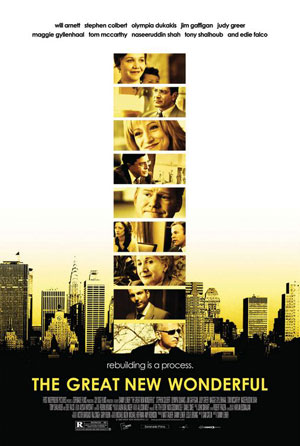 I’ve been a fan of Danny Leiner’s for some time now – I think his broad comedies Dude, Where’s My Car and especially Harold and Kumar Go To White Castle have some brilliance in them, and I suspected that there was more to Leiner than these two films let on.
I’ve been a fan of Danny Leiner’s for some time now – I think his broad comedies Dude, Where’s My Car and especially Harold and Kumar Go To White Castle have some brilliance in them, and I suspected that there was more to Leiner than these two films let on.
Turns out I was right. The Great New Wonderful is Leiner’s Magnolia-esque tale of New Yorkers struggling with the aftermath of 9/11. Just like in real life they’re not dealing with it head on – the shock and trauma manifests itself in various ways throughout their lives. The film is quirky and lovely, and features some fine performances from the likes of Judy Greer, Maggie Gyllenhaal, Jim Gaffigan, Tony Shalhoub and Olympia Dukakis. The film was finished and played at the Tribeca Film Festival last year, but it’s finally getting a theatrical release starting this week.
Danny was kind enough to take almost an hour out of his day to talk about this movie, his other films, working on The Sopranos and 9/11 in general. Be sure to check out the film’s website here to see when The Great New Wonderful is coming to your town.
Q: I want to start by telling you that I got a death threat for giving Dude, Where’s My Car a good review on DVD.
Leiner: Wow. A lot of passion about that movie.
Q: What is the reaction you get about that movie today?
Leiner: It’s funny. I definitely get a very diverse reaction. It’s one way or the other – they really like it or they really hate it. It’s rare that somebody is in the middle on that movie. The people who love it think it’s hilarious, the people who hate it don’t want to talk it about it.
Q: I think people will be surprised that The Great New Wonderful comes from the same guy who did Dude and Harold and Kumar, but you were doing more serious work before you started the broad comedies.
Leiner: I went up for Dude, Where’s My Car as an assignment because I wanted to get into studio features. I had been directing a bunch of TV, and before that I had been in the New York indie film scene. So The Great New Wonderful is kind of me going back to my New York indie roots, but since I’m known as this broad comedy director because of Harold and Kumar and Dude, I think people will be surprised.
Q: Where were you on 9/11?
Leiner: I was in LA. I was actually shooting a TV show and had to be up at 5 in the morning and was going in to Warner Bros, where we were shooting. I was listening to Howard Stern and I heard something and then I went in to get a coffee and I heard something else at the coffee place. So I drove in to work, this little TV show called Maybe It’s You – Fred Willard was in it, and a couple of other people. It was insane – we were all sitting around the dolly where they had a monitor that got a signal and we all watched the second building get hit. Then we all went home pretty much right after that. I spent a few days just in my house, watching the news. That was my experience, being bunkered down in my house watching the news – and of course checking in with my family, who live in New York. It was pretty wild being out here and watching all of this happen.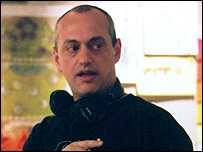 Q: I’m a New Yorker and I was in New York on 9/11, and The Great New Wonderful really resonates personally because that year afterwards was so surreal, and people were dealing with it in such odd ways. How does a New Yorker living in LA deal with that year after?
Q: I’m a New Yorker and I was in New York on 9/11, and The Great New Wonderful really resonates personally because that year afterwards was so surreal, and people were dealing with it in such odd ways. How does a New Yorker living in LA deal with that year after?
Leiner: There’s a true sense of dislocation for me. Being here while that was happening, all these people who I’m connected to were going through this… LA is itself a dislocating place to begin with, due to the fact that there’s no core to the city really – it’s all random satellite neighborhoods. So that just increased that feeling for me, and the feeling of not being there and not sharing that experience made me feel that I would never be in New York in the same way again, not being there for that. It was hard for everyone, but it was kind of odd and unsettling.
I have to say, one interesting thing about my work in terms of 9/11, and we were talking about Dude, Where’s My Car: one thing that happened is that after 9/11 a lot of people were just freaked out in New York and were looking for some mindless stuff to do, and I can’t tell you how many calls I got from people who were renting Dude, Where’s My Car as this total escape. They were just digging the silliness of the movie. Now I’m doing this movie that’s specifically about 9/11, but that movie has its place in there.
Q: In The Great New Wonderful 9/11 is almost never discussed. Why did you make the decision to not directly connect the film to 9/11?
Leiner: It came on a number of fronts. When I was involved in the development process with the writer Sam Catlin, it was pretty close to 9/11; it was about a year afterwards that we thought about writing something set in New York. The original conceit was to do a kind of ensemble piece that took place in New York, and it was very hard six or eight months after 9/11 to think about New York without the specter of 9/11 just being there. We realized that if we were going to write about New York in the way we were thinking about, we were going to have to embrace the fact that this was the post-9/11 world. So that’s what we did, but we also had trepidations – I wasn’t interested in doing a movie about 9/11 and about events of the day, or leading up or directly afterwards. I was much more interested in what the effect was on New Yorkers. It came from the reactions of the people I knew and I talked to, and even when I traveled to New York a few months afterwards.
Thinking about it at the time when we decided to tackle the subject, because it was inevitable, it was very interesting; you don’t see many New Yorkers reaction and non-reaction – this movie deals with healing but it also deals with denial. Each of the characters has elements of denial that they’re not coping with. And the writer, Sam, a lot of his writing is already in that mode, so it felt very organic to move in that direction.
Q: Did you tailor the roles for the actors, or did the actors come on board after the characters were set?
Leiner: These characters are very specifically what was written, and each of the cast members that were brought on brought their amazing talent and creativity to the role. It feels organic because the writing is so specific, and there’s something intense and amazing about it that really attracted the cast. It’s a testament to the script. You see Tony Shaloub as Dr. Trabulous, or Maggie Gyllenhall, or all these great actors who came in – Stephen Colbert, Judy Greer, Olympia Dukakis – all of them just embody these roles because they were specifically drawn to these characters.
Q: The Tony Shaloub and Jim Gaffigan section is in many ways the weirdest part of the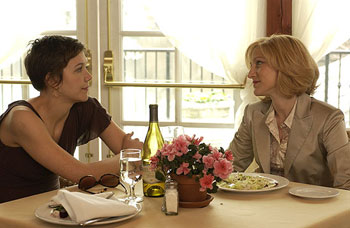 film – it’s almost the wackiest part until it gets very, very serious.
film – it’s almost the wackiest part until it gets very, very serious.
Leiner: I think that in a way the Dr. Trabulous/Sandy scenes were kind of the anchor of the movie. I always saw it that you come back each day [in the movie] to another day with them. They kind of anchored the film, and as the movie moves along you keep coming back to them, and as that progresses, the movie gets more intense. It’s indicative of how the movie hopefully works, in that you’re seeing these characters who are moving through the world and everything seems to be OK, and there are some things underneath you’re picking up, but everything seems to be normal. And then you start to have what’s underneath percolating and comes to a boil and it becomes palpable. Those two actors and their journey represent the movie. It has humor to it, and to me New Yorkers post-9/11 – and New Yorkers in general – have a lot of comedy in anger; these things get mixed up. Those characters embody that.
Q: How did you know that Jim Gaffigan would be able to go to the dark places his character does?
Leiner: I had no idea! I just brought him in to audition and he blew me away. He was the one person who was just unbelievable in his audition. He just understood his character. I didn’t know that much about Jim, I hadn’t seen his comedy, and I wasn’t aware of the work he was doing on the acting side. It was sheerly someone came in for an audition because I thought his headshot looked like he could be good, and he did a tremendous job.
Q: One of the things I like about the film is that you shoot New York really well, and not obviously – you’re not shooting famous streets or landmarks but these streets that New Yorkers will recognize and that feel like New York City. How tough was it to find and get these locations?
Leiner: It was a particularly arduous shoot for a number of reasons. One is that we had very, very little money. We started shooting at five hundred thousand dollars and went up a little more, but we finished at probably about 550,000 bucks. It was a really intense experience doing a movie in New York with the caliber of cast that we had. It wasn’t like we were running and gunning in the East Village and filming junkies, or something that lends itself to that kind of energy and lack of lighting and set-ups – that just wasn’t something I wanted to shoot for this movie. There could be many, many great movies that embrace that tradition, but on this one I was on a mission to treat it as a beautiful movie. With very little money it was difficult to do.
That was our biggest hurdle. And then of course it was about getting locations, and all those things become very hard. It’s part of the process. We shot on HD, which has its ups and downs in terms of technical limitations and the care it takes to make it look good. These are things we were up against that I think went above and beyond filming that just happened to take place in New York.
Another aspect of it is that the movie is different stories, which is kind of fun, because it’s like doing five separate short movies. We would wrap up Shalhoub and Gaffigan and then move on to Olympia. We were doing different stories and had to keep in mind to visually connect them because the movie is about the disparate stories. Part of the challenge of this movie was to make it feel visually as one while differentiating.
So the answer is that in regards to the aesthetic that you’re responding to, it was just about trying to make it work for each story and show the New York that is the fabric of a city. I 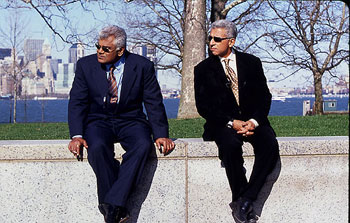 wasn’t particularly interested in seeing images we had already seen; I actually think there are a lot of images that I hadn’t seen in film before, like the shots of the Statue of Liberty, which we were blessed to be able to get on. The Statue of Liberty at that time was pretty much closed to the public.
wasn’t particularly interested in seeing images we had already seen; I actually think there are a lot of images that I hadn’t seen in film before, like the shots of the Statue of Liberty, which we were blessed to be able to get on. The Statue of Liberty at that time was pretty much closed to the public.
Q: You have the one scene where the characters meet up in the elevator, but the stories don’t ever come together otherwise. Did you ever consider having more crossover in the stories, or were they always meant to stay separate?
Leiner: Early in the process we actually had less unifying elements. We added more as we went on because we somewhat gauged it by feedback from friends who were reading it. We had discussed a little bit more connection, but not much. I like the disparity and I do like that they briefly connect and head off in different directions. To me those five people meet in this elevator, and if we were in another elevator maybe we would be following five different stories. That’s how I look at the movie.
Q: Are you surprised at the way Harold and Kumar have had an impact? I feel like it’s a movie that’s entered the consciousness of a certain generation.
Leiner: A little surprised. Just judging by the way people react when meeting me, a lot of people are really into that movie and see it as something that speaks to them – in a broad, comedic way! Not to get too heavy about it. But I love the movie, and it doesn’t surprise me too much that people like the humor of it because I thought it was a really funny script, and I thought we were lucky enough to get some great people involved in it, in terms of the cast. Just the fact that it touches on stereotypes and pop culture and things people are keyed into.
Q: It’s the stereotype stuff that fascinates me, because here’s a movie that a studio could have easily requested star two white, WB-style leads, but you kept with the non-traditional leads, and the movie shows you can have success with diversity in casting.
Leiner: I think it’s very cool. The funny thing about that is that, believe me, we had a studio or two who came back and said, ‘What if we make it a black guy and a white guy?’ There was a lot of that kind of jostling before we were ready to go. You’re right on the money with thinking that’s how the studios would react. Fortunately Senator, the company that produced it and is now called Mandate, along with the writers and producers and myself, were all of the same mind, that that is the core of the movie. That’s what fun and great and kind of sweet about the movie – that very element. To do it without that is what the movie is talking about.
I’m really happy about the success. We didn’t do that great on a box office level, and there are a lot of factors in that, including when we opened and what we opened against. But we have done incredibly well on DVD, and I think that speaks to people finding the movie and really loving it. For a movie that did so-so at the box office to have a sequel made shows how much it must have made on DVD.
Q: You directed an episode of The Sopranos where Lauren Bacall gets punched in the face.
Leiner: I don’t think many people have that on their resume. It was fun. She was a trooper – working with Sir Ben and Lauren Bacall on a Sopranos episode? It was pretty surreal.
Q: Gary the Tennis Coach – is it a return to the broad comedy?
Leiner: Gary is a broad comedy, but it’s also has a cool indie spirit to it. Hopefully it’ll have a good combination of the two. I look at it as the last of the broad comedy trilogy. A script just came across my desk that I thought was hilarious. When I read Harold and Kumar, at that point I didn’t want to do another broad comedy but that movie was just so funny and it went beyond just a broad comedy – Gary just made me laugh. I love the voice of the character and it’s so original. It’s rare that I get a script where I want to stop everything else and want to do it.
Q: Was Seann William Scott attached when it came to you, or did you bring him on?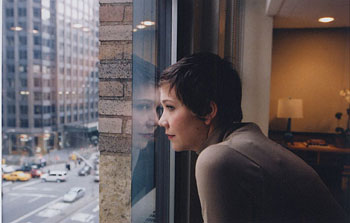 Leiner: We were both kind of attached concurrently. I’m not sure of the timing of it, but when I got the script I didn’t know he was attached, but when I was reading it I found out he was, and I was really happy – he really is Gary the Tennis Coach.
Leiner: We were both kind of attached concurrently. I’m not sure of the timing of it, but when I got the script I didn’t know he was attached, but when I was reading it I found out he was, and I was really happy – he really is Gary the Tennis Coach.
Q: Going back to The Great New Wonderful, is there a feeling of responsibility as a filmmaker because of the subject you’re tackling?
Leiner: It’s a movie that’s dealing with a subject matter that’s intense and has a lot of meaning and feeling for a lot of people, so I do… I don’t know if I would say I feel responsible, but I want the movie to feel true and have a sense of respect and acknowledgement. You don’t go into it with blinders on.
Q: Your film is being released after United 93, but you had finished this a year or so ago – it played Tribeca last year. It’s sort of interesting that it took so long for people to start tackling it.
Leiner: I kind of understand. As I said, when we started the writing process on this film I wasn’t interested in seeing movies about 9/11. Even now I ended up seeing United 93, and I thought it was great, but I initially went to see it because my movie was coming out and there was a kinship and I was curious about it. But on a personal level I wasn’t sure I was ready to see a movie about that. So it doesn’t surprise me – I didn’t want to make a movie about it at the time, I made a movie about the healing and aftermath and how New Yorkers dealt. That felt like something I could explore in a movie. I’m actually kind of surprised movies are coming out so soon. I think Great New Wonderful is unique in that it’s about the post-9/11 world, while World Trade Center and United 93 are about the events of that day.
But the way it’s played out in regards to where the movie’s opening, I think it found its spot. It’s between these two big movies, and it’s about five years after 9/11, and it’s a time when people are interested in examining that event and seeing movies that deal with the subject.
Q: At the end of Great New Wonderful there’s a sense of catharsis for the characters. Have you reached that yet in terms of 9/11?
Leiner: I can’t say I had a specific cathartic moment. I feel like there’s been a healing over time, where it doesn’t become the overwhelming event of our time, where it just stays in your consciousness. When I go to New York there are always reminders but it’s not forefront in my consciousness; it’s not as prevalent. As a lot of New Yorkers have had, I’ve had a moving on. An acknowledgment that it happened, but like in the movie, all these characters have moved on.